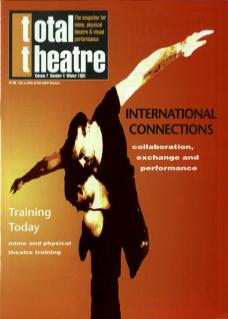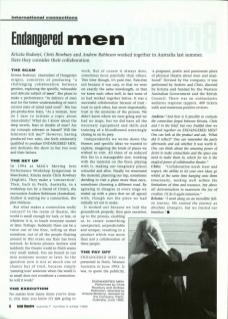The Scam
Kriszta Bodonyi (Australian of Hungarian origin), conceives of producing ‘a challenging collaboration between genders, exploring the specific, vulnerable and delicate subject of men’. She plans to make a performance ‘in defence of men and for the better understanding of men's current state of mind (and soul)’. She has pre-production fears, ‘As a woman, how do I dare to initiate a topic about masculinity? What do I know about the deep secrets, fears or doubts of men? Are my concepts relevant or biased? Will the feminists kill me?’ However, having produced two sons, she feels eminently qualified to produce Endangered Men, and dedicates the show to her two sons and their fathers.
The Set-up
In 1994 at MAG's Moving Into Performance Workshop Symposium in Manchester, Kriszta meets Chris Rowbury (English). They make a 'connection'. Then, back in Perth, Australia, in a workshop run by a friend of Chris', she encounters Andrew Robinson (Australian). Andrew is waiting for a connection, the plot thickens.
But what makes a connection really connect? In the realm of theatre, the world is small enough for luck, or fate, or whatever it is, to touch everyone sooner or later. Perhaps. Suddenly there can be a voice out of the blue, telling us that somehow, out of all the people floating around in this ocean, our flare has been noticed. So Kriszta phones Andrew and suddenly the theatre world in Perth seems very small indeed. You are bound to run into someone sooner or later. So the question now is not so much one of chance but of trust, because simply 'running into someone’ when the world is so small does not constitute a connection. So will it work?
The Execution
No matter how many times you've done it, this time you know it's not going to work. But of course it always does, sometimes more painfully than others. This time though, it's pain free. Pain-free not because it was easy, or that we were on exactly the same wavelength, or that we knew each other well, in fact none of us had worked together before. It was a successful collaboration because of trust – trust in each other, but more importantly, trust in the mysteries of the process. We didn't know where we were going and we had no maps, but we did have all the necessary equipment and skills and training of a bloodhound unerringly closing in on its prey.
Independently we wrote down the themes and specific ideas we wanted to explore, imagining the kinds of places we wished to visit. All three of us reduced this list to a manageable size, working with the material on the floor, playing with it, making our imaginary places colourful and alive. Finally we structured the material, planning our trip, sometimes deciding to visit a place more than once, sometimes choosing a different road. By agreeing to disagree at every stage we ended up with a piece that we all agreed with, though not the piece we had initially set out to make.
It worked out because we laid the groundwork properly, then gave ourselves up to the process, enabling us to create something unexpected, unpredictable and unique, resulting in a product which was more than just a collaboration of three people.
The Pay Off
Endangered Men was presented in Perth, Western Australia in June 1995. It was, to quote the publicity, 'a poignant, poetic and passionate piece of physical theatre about men and manhood'! Devised by the company, it was performed by Andrew and Chris, directed by Kriszta and funded by the Western Australian Government and the British Council. There was an enthusiastic audience response (approx. 400 tickets sold) and numerous positive reviews.
Andrew: ‘And how is it possible to evaluate the connection forged between Kriszta, Chris and I in the brief, but very fruitful time we worked together on Endangered Men? One can look at the product and ask, “What did it reflect?” One can remember the party afterwards and ask whether it was worth it. One can think about the amazing power of desire to make connections and the space you need to make them in, which for me is the magical power of collaborative theatre.’
Chris: ‘Collaboration needs trust and respect, the ability to let your own ideas go whilst at the same time hanging onto them tenaciously, working well within the limitations of time and resources, but above all determination to maintain the joy of creation. I'd do it again tomorrow.’
Kriszta: ‘I went along on an incredible full-on journey. We started the journey as absolute strangers, but we trusted our intuition.’

